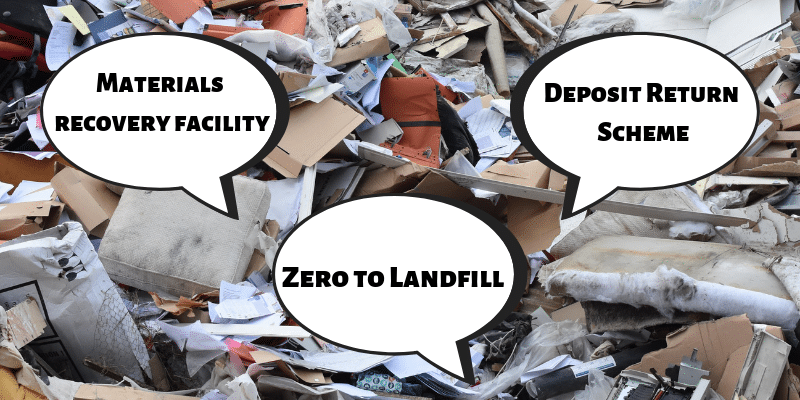There can no longer be any doubt that the big subject on everyone’s lips in 2019 is … waste! But it’s a complex subject with new twists in the story emerging every week. To help, DCW – proud to be the South West’s first operator committed to a ‘zero to landfill’ approach – brings you a glossary of 10 of the hot terms in the world of waste in 2019.
How we got here
Kicked off by the game-changing David Attenborough TV programme on whales, we arrived all of a sudden at a ’tipping point’ where the need for a new approach to waste was no longer up for discussion.
Then, just before Christmas, the winning International Statistic of 2018 was announced as 90.5%: the proportion of plastic waste that has never been recycled. Estimated at 6,300 million metric tonnes, it’s thought that around 12% of all plastic waste has been incinerated, with roughly 79% accumulating in either landfill or the natural environment.
Waste words
Cradle-to-cradle: A term used in life-cycle analysis to describe a material or product that is recycled into a new product at the end of its life, so that ultimately there is no waste. In direct contrast, cradle-to-grave is a term used to describe a model that begins with resource extraction, moves to product manufacturing, and, ends by a ‘grave’, where the product is disposed of in a landfill.
Materials recovery facility (MRF): A special facility for separating recyclable materials mechanically or manually. The waste is placed in different categories like glass, plastic, paper and metal. DCW is one of these.
Deposit Return Scheme (DRS): Levies a small deposit on certain products with the money being paid back to the customer on the return of the empty packaging. The concept has been around for many years and many European Countries have active deposit return schemes in place. It’s in the new Resource and Waste Strategy.
Recyclables: Products or items that can be reprocessed for the purpose of manufacturing new products. The most common recyclable materials are paper, aluminium, glass and plastic containers. DCW sorts them out for you.
Extended producer responsibility (EPR): In the Strategy too, making those that produce the materials more accountable for the costs of the materials across their whole lifecycle. A Bill is going through Parliament at the moment to require producers of packaging products to assume responsibility for the collection, transportation, recycling, disposal, treatment and recovery of those products.
Sustainability: Meeting the needs of the current generation in a way that doesn’t harm the ability of future generations to meet theirs. DCW removes the hassle of waste management and offers businesses a simple way to boost their green credentials.
(Universal) Food Waste Collections: Separate collections for food waste to make the green biogas that can fertilise our crops and heat our homes. An environmentally sustainable option for waste management that cuts down on landfill.
WEEE: Stands for Waste Electrical and Electronic Equipment and includes computers, TVs, microwaves and other electrical appliances. The safe handling and disposal of electronic waste is governed by a separate set of standards to other waste materials. DCW assists businesses to achieve regulatory compliance with the aim of protecting the environment as well as the interests of your organisation.
Integrated Waste Management: Refers to the complementary use of multiple practices to handle municipal solid waste effectively and safely.
Zero to Landfill: Our philosophy at DCW. It means that the majority of the waste we collect can be recycled. Waste that can’t be recycled is processed for Energy from Waste, ensuring that nothing is sent to landfill. Energy from Waste, also known as incineration, is defined as ‘generating energy in the form of electricity and/or heat from the primary treatment of waste, or the processing of waste into a fuel source’.
